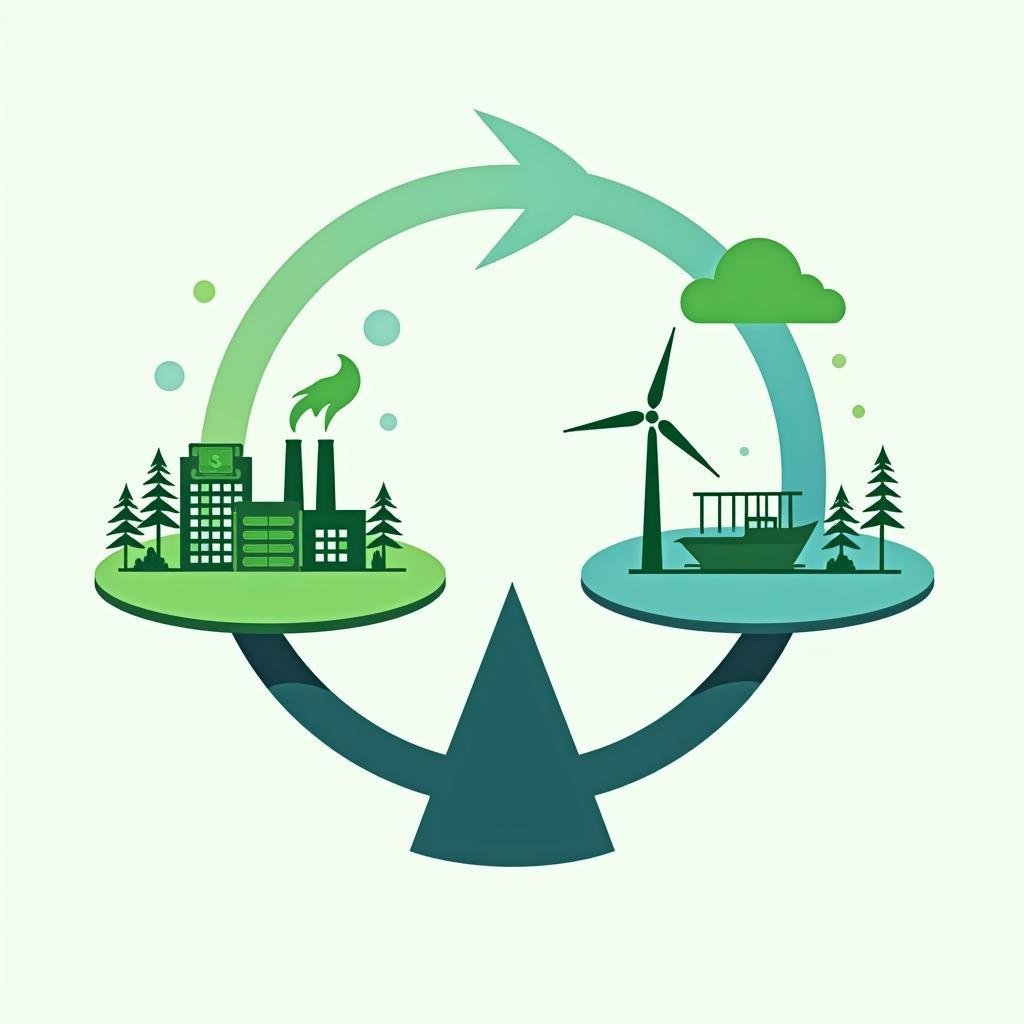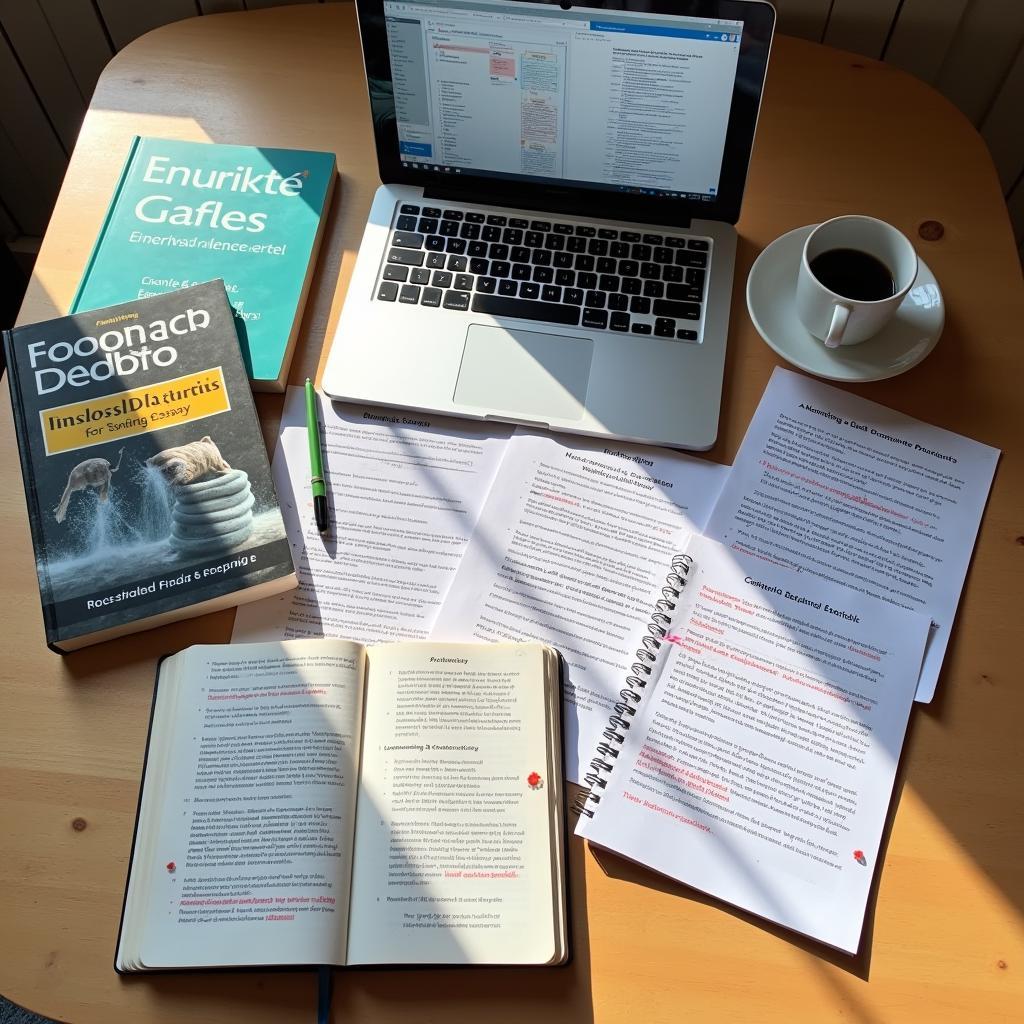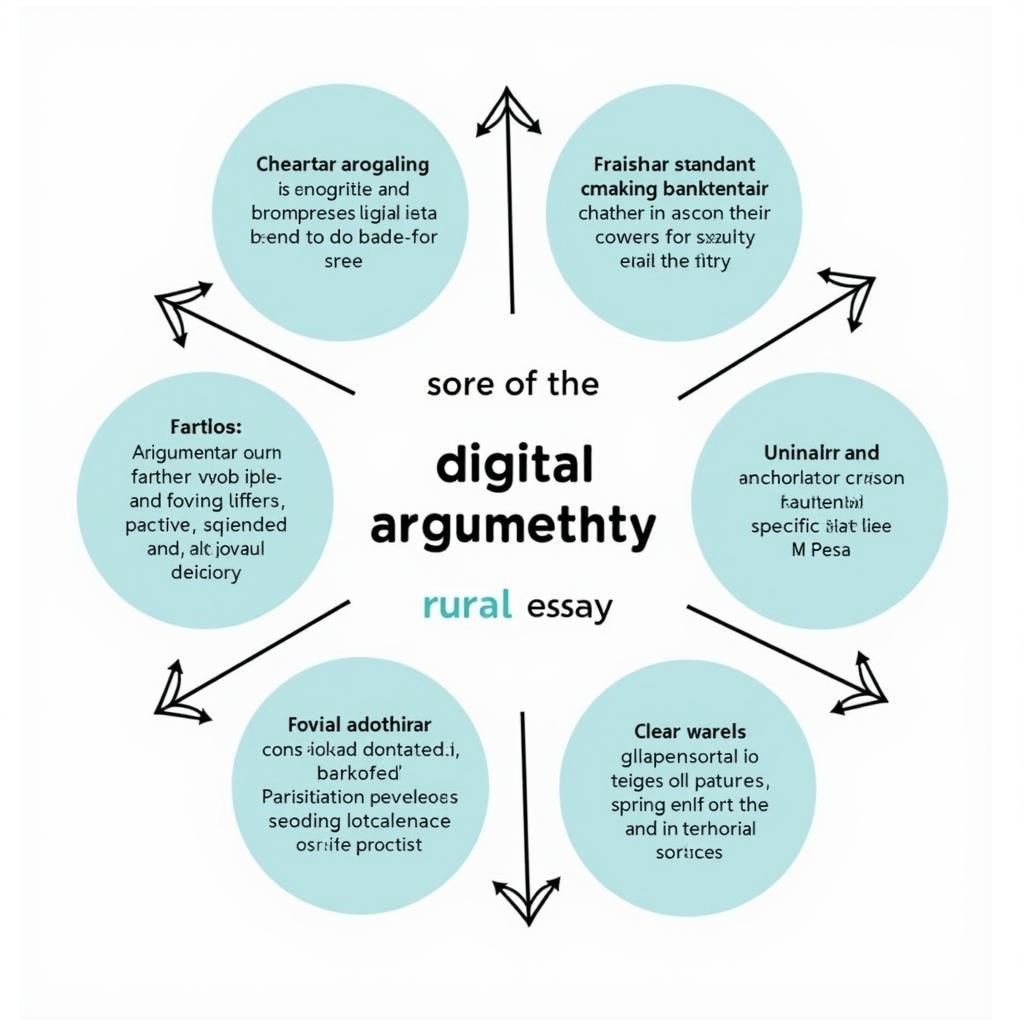Trong bối cảnh biến đổi khí hậu ngày càng trở nên cấp bách, chủ đề cân bằng giữa phát triển kinh tế và bảo vệ môi trường là một trong những đề tài xuất hiện thường xuyên nhất trong IELTS Writing Task 2. Theo thống kê từ các trung tâm thi chính thức, dạng đề này xuất hiện trung bình 3-4 lần mỗi năm, đặc biệt tập trung vào các kỳ thi từ tháng 3 đến tháng 9.
Bài viết này sẽ cung cấp cho bạn một cái nhìn toàn diện về cách tiếp cận chủ đề này, bao gồm:
- 3 bài mẫu hoàn chỉnh từ Band 5 đến Band 8-9 với phân tích chi tiết
- Bảng chấm điểm cụ thể theo 4 tiêu chí của IELTS
- Hơn 15 từ vựng và cụm từ chuyên ngành quan trọng
- 6 cấu trúc câu “ăn điểm” cao thường thấy ở bài Band 8+
Một số đề thi thực tế đã xuất hiện gần đây:
- “Some people think that economic growth is the only way to end world poverty and hunger, while others believe it is damaging the environment and should be stopped. Discuss both views and give your opinion.” (British Council, tháng 5/2023)
- “Economic progress is often used to measure a country’s success. However, some people believe that other factors are more important. Discuss both views and give your opinion.” (IDP, tháng 8/2023)
Như bạn có thể tham khảo thêm về cách tạo ra các thực hành kinh doanh bền vững trong thế giới toàn cầu hóa, vấn đề này không chỉ xuất hiện trong đề thi mà còn là thách thức thực tế mà các quốc gia đang phải đối mặt.
Đề Writing Part 2 Thực Hành
Some people believe that economic development should be prioritized over environmental protection, while others argue that protecting the environment is more important for long-term prosperity. Discuss both views and give your own opinion.
Dịch đề: Một số người tin rằng phát triển kinh tế nên được ưu tiên hơn bảo vệ môi trường, trong khi những người khác lập luận rằng bảo vệ môi trường quan trọng hơn cho sự thịnh vượng lâu dài. Thảo luận cả hai quan điểm và đưa ra ý kiến của bạn.
Phân tích đề bài:
Đây là dạng câu hỏi “Discuss both views and give your opinion” – một trong những dạng phổ biến nhất trong IELTS Writing Task 2. Đề bài yêu cầu bạn:
- Thảo luận quan điểm 1: Ưu tiên phát triển kinh tế hơn bảo vệ môi trường
- Thảo luận quan điểm 2: Bảo vệ môi trường quan trọng hơn cho sự phát triển bền vững
- Đưa ra quan điểm cá nhân: Bạn đồng ý với quan điểm nào hoặc có lập trường cân bằng
Các thuật ngữ quan trọng cần hiểu:
- “Economic development” (phát triển kinh tế): tăng trưởng GDP, công nghiệp hóa, tạo việc làm
- “Environmental protection” (bảo vệ môi trường): giảm ô nhiễm, bảo tồn tài nguyên, chống biến đổi khí hậu
- “Long-term prosperity” (thịnh vượng lâu dài): phát triển bền vững cho các thế hệ tương lai
Những lỗi thường gặp của học viên Việt Nam:
- Chỉ thảo luận một quan điểm mà bỏ qua quan điểm còn lại
- Không đưa ra ý kiến cá nhân rõ ràng
- Dùng ví dụ quá chung chung, thiếu tính thuyết phục
- Lạm dụng cụm “on the one hand… on the other hand” mà không phát triển ý sâu
Cách tiếp cận chiến lược:
- Viết Introduction: paraphrase đề bài + thesis statement (quan điểm của bạn)
- Body 1: Thảo luận quan điểm ưu tiên kinh tế (2-3 lý do + ví dụ)
- Body 2: Thảo luận quan điểm ưu tiên môi trường (2-3 lý do + ví dụ)
- Body 3 (tùy chọn): Phát triển quan điểm cá nhân hoặc đưa ra giải pháp cân bằng
- Conclusion: Tóm tắt và khẳng định lại quan điểm
 Học viên đang luyện viết IELTS Writing Task 2 về chủ đề cân bằng kinh tế và môi trường
Học viên đang luyện viết IELTS Writing Task 2 về chủ đề cân bằng kinh tế và môi trường
Bài Mẫu Band 8-9
Giới thiệu
Bài viết Band 8-9 dưới đây thể hiện các đặc điểm nổi bật: cấu trúc rõ ràng, lập luận mạch lạc, từ vựng đa dạng và chính xác, ngữ pháp phức tạp với ít lỗi sai. Đặc biệt, bài viết không chỉ thảo luận cả hai quan điểm một cách cân bằng mà còn đưa ra lập trường cá nhân thuyết phục với ví dụ cụ thể.
The debate over whether economic advancement should take precedence over environmental conservation has become increasingly contentious in recent decades. While some argue that prioritizing economic growth is essential for alleviating poverty and improving living standards, others contend that safeguarding the environment is paramount for sustainable prosperity. In my view, these two objectives are not mutually exclusive but rather interdependent, and a balanced approach is crucial for long-term success.
Those who advocate for prioritizing economic development often cite the immediate benefits it brings to society. Rapid industrialization and commercial expansion can create millions of jobs, lifting communities out of poverty and providing access to education, healthcare, and infrastructure. For instance, China’s economic boom over the past three decades has lifted over 800 million people out of extreme poverty, demonstrating how economic growth can transform societies. Furthermore, a strong economy generates tax revenues that governments can subsequently invest in environmental protection programs. Without sufficient economic resources, many developing nations would struggle to implement green technologies or enforce environmental regulations effectively.
However, the opposing view emphasizes that unchecked economic expansion often comes at an unsustainable environmental cost. The relentless pursuit of profit has led to deforestation, air and water pollution, and accelerated climate change, which ultimately undermines economic productivity. Vietnam’s Mekong Delta, for example, faces severe challenges from saltwater intrusion and land subsidence, partly caused by upstream dam construction for hydroelectric power—an issue that now threatens the region’s agricultural output and economic stability. Moreover, environmental degradation disproportionately affects vulnerable populations, creating health crises that drain economic resources through increased healthcare costs and reduced workforce productivity.
In my opinion, the most effective approach lies in integrating environmental considerations into economic planning rather than treating them as competing priorities. Governments and businesses should adopt circular economy principles, invest in renewable energy infrastructure, and implement policies that incentivize sustainable practices. Costa Rica exemplifies this balanced strategy, having achieved steady economic growth while increasing forest coverage from 26% to over 50% through ecotourism and payment for ecosystem services programs. Such initiatives demonstrate that environmental protection can actually drive economic innovation and create new markets.
In conclusion, while economic development addresses immediate human needs, it must be pursued in harmony with environmental stewardship to ensure long-term prosperity. Rather than choosing one over the other, societies must recognize that a healthy environment is the foundation upon which sustainable economic growth is built. Only through this integrated approach can we secure both present welfare and future viability for generations to come.
(445 từ)
Phân Tích Band Điểm
| Tiêu chí | Band | Nhận xét |
|---|---|---|
| Task Response (Hoàn thành yêu cầu) | 9.0 | Bài viết thảo luận đầy đủ và cân bằng cả hai quan điểm với các lập luận thuyết phục. Quan điểm cá nhân được trình bày rõ ràng ngay từ mở bài và phát triển xuyên suốt. Các ví dụ cụ thể (Trung Quốc, Việt Nam, Costa Rica) rất thuyết phục và liên quan trực tiếp đến lập luận. |
| Coherence & Cohesion (Mạch lạc & Liên kết) | 9.0 | Cấu trúc bài logic hoàn hảo với sự chuyển tiếp mượt mà giữa các đoạn. Sử dụng đa dạng linking devices (While, However, Furthermore, Moreover, In my opinion) một cách tự nhiên. Mỗi đoạn có central idea rõ ràng và được phát triển nhất quán. Không có câu nào gây hiểu lầm. |
| Lexical Resource (Từ vựng) | 8.5 | Từ vựng phong phú và chính xác với nhiều collocations học thuật xuất sắc (take precedence over, mutually exclusive, unchecked expansion, circular economy principles). Sử dụng paraphrasing hiệu quả (economic advancement/development/growth, environmental conservation/protection/stewardship). Không có lỗi từ vựng đáng kể. |
| Grammatical Range & Accuracy (Ngữ pháp) | 9.0 | Sử dụng đa dạng cấu trúc câu phức tạp hoàn toàn chính xác (mệnh đề quan hệ, phân từ, câu điều kiện, danh động từ). Không có lỗi ngữ pháp. Câu văn dài nhưng rõ ràng, không rườm rà. Kiểm soát tuyệt vời các thì động từ và mạo từ. |
Các Yếu Tố Giúp Bài Này Được Chấm Điểm Cao
-
Thesis statement mạnh mẽ và độc đáo: Thay vì đơn giản chọn một bên, người viết lập luận rằng hai mục tiêu này “interdependent” (phụ thuộc lẫn nhau), thể hiện tư duy phản biện cao.
-
Ví dụ cụ thể và đa dạng về địa lý: Sử dụng ba ví dụ từ ba châu lục khác nhau (Trung Quốc, Việt Nam, Costa Rica), cho thấy hiểu biết toàn cầu và khả năng áp dụng kiến thức vào lập luận.
-
Cấu trúc topic sentence xuất sắc: Mỗi đoạn thân bài bắt đầu bằng câu chủ đề rõ ràng (Those who advocate…, However, the opposing view…, In my opinion…) giúp người đọc dễ theo dõi.
-
Sử dụng collocation học thuật tự nhiên: Các cụm như “take precedence over”, “comes at an unsustainable cost”, “disproportionately affects” cho thấy trình độ từ vựng vượt trội mà không gượng ép.
-
Phát triển ý sâu với cause-effect reasoning: Không chỉ nêu lý do mà còn giải thích hậu quả, ví dụ: environmental degradation → health crises → increased healthcare costs → reduced productivity.
-
Kết bài không lặp lại máy móc: Thay vì tóm tắt đơn giản, kết bài thăng hoa lên tầm tư tưởng với cụm “a healthy environment is the foundation upon which sustainable economic growth is built”.
-
Từ vựng paraphrasing tinh tế: Economic development được diễn đạt lại thành economic advancement, economic growth, commercial expansion; Environmental protection thành environmental conservation, safeguarding the environment, environmental stewardship.
Khi nghiên cứu về việc các quốc gia nên ưu tiên phát triển công nghệ xanh hay không, chúng ta thấy rằng nhiều lập luận tương tự được áp dụng trong việc cân bằng giữa phát triển và bảo vệ môi trường.
 Biểu đồ minh họa mối quan hệ cân bằng giữa tăng trưởng kinh tế và bảo vệ môi trường bền vững
Biểu đồ minh họa mối quan hệ cân bằng giữa tăng trưởng kinh tế và bảo vệ môi trường bền vững
Bài Mẫu Band 6.5-7
Giới thiệu
Bài viết Band 6.5-7 dưới đây thể hiện khả năng hoàn thành tốt nhiệm vụ với cấu trúc rõ ràng và các ý tưởng phù hợp. Tuy nhiên, so với bài Band 8-9, bài này có từ vựng ít đa dạng hơn, cấu trúc câu đơn giản hơn và ví dụ chưa cụ thể bằng.
Nowadays, there is a debate about whether economic development or environmental protection should be more important. Some people think that economic growth should come first, while others believe that protecting the environment is more crucial for the future. This essay will discuss both views and give my opinion.
On the one hand, those who support economic development have several reasons. Firstly, economic growth can help reduce poverty in many countries. When a country develops its economy, it can create more jobs for people and improve their living standards. For example, many Asian countries like China and Vietnam have grown their economies quickly and this has helped millions of people have better lives. Secondly, a strong economy gives governments more money to spend on important things like education, healthcare, and infrastructure. Without economic development, countries may not have enough resources to solve environmental problems.
On the other hand, many people argue that protecting the environment should be the priority. The main reason is that environmental damage can cause serious problems in the long term. If we continue to pollute the air and water, it will affect people’s health and cause diseases. Climate change is also becoming a big problem because of industrial activities. Moreover, once natural resources are destroyed, it is very difficult or impossible to restore them. For instance, if we cut down all the forests, we will lose many animal species and the environment will be damaged forever.
In my opinion, I believe that both economic development and environmental protection are important and should be balanced. Countries should try to grow their economies but at the same time protect the environment. This can be done by using clean energy, reducing pollution, and making laws to protect nature. For example, some countries are investing in solar and wind power instead of coal, which is good for both the economy and the environment.
In conclusion, while economic development is necessary for improving people’s lives, it should not be done at the expense of the environment. Governments need to find ways to balance both goals to ensure a sustainable future for everyone.
(391 từ)
Phân Tích Band Điểm
| Tiêu chí | Band | Nhận xét |
|---|---|---|
| Task Response (Hoàn thành yêu cầu) | 7.0 | Bài viết đã thảo luận đầy đủ cả hai quan điểm và đưa ra ý kiến cá nhân rõ ràng. Tuy nhiên, các lập luận còn khá chung chung và thiếu ví dụ cụ thể, chi tiết. Ví dụ về Trung Quốc và Việt Nam chưa được mở rộng để thực sự thuyết phục người đọc. |
| Coherence & Cohesion (Mạch lạc & Liên kết) | 6.5 | Cấu trúc bài rõ ràng với các đoạn văn được tổ chức logic. Sử dụng linking words cơ bản (Firstly, Secondly, On the other hand, In my opinion) nhưng chưa đa dạng. Một số chuyển tiếp giữa câu còn đơn điệu và thiếu sự mượt mà. |
| Lexical Resource (Từ vựng) | 6.5 | Từ vựng đủ để truyền đạt ý tưởng nhưng còn lặp lại nhiều (economic development xuất hiện 5 lần, environment/environmental 8 lần). Có một số collocations tốt (reduce poverty, living standards, natural resources) nhưng thiếu từ vựng học thuật cao cấp. Không có lỗi từ vựng nghiêm trọng. |
| Grammatical Range & Accuracy (Ngữ pháp) | 7.0 | Sử dụng nhiều cấu trúc câu phức (When, If, While) với độ chính xác khá tốt. Có sự đa dạng về thì động từ. Tuy nhiên, phần lớn là câu phức đơn giản, thiếu các cấu trúc nâng cao như mệnh đề quan hệ không xác định, câu điều kiện phức tạp, hoặc đảo ngữ. |
So Sánh Với Bài Band 8-9
| Khía cạnh | Band 6.5-7 | Band 8-9 |
|---|---|---|
| Introduction | “there is a debate about whether…” – đơn giản, trực tiếp | “has become increasingly contentious” – từ vựng học thuật, sophisticated hơn |
| Thesis statement | “will discuss both views and give my opinion” – rõ ràng nhưng máy móc | “these two objectives are not mutually exclusive but rather interdependent” – thể hiện tư duy phản biện |
| Ví dụ cụ thể | “many Asian countries like China and Vietnam” – chung chung, không có số liệu | “China’s economic boom… lifted over 800 million people” – cụ thể, có dữ liệu thuyết phục |
| Topic sentence | “On the one hand, those who support…” – cơ bản, đúng | “Those who advocate for prioritizing…” – paraphrasing tốt, tránh lặp từ |
| Linking devices | Firstly, Secondly, For example – lặp lại, đơn điệu | Furthermore, Moreover, For instance – đa dạng và tự nhiên hơn |
| Conclusion | “should not be done at the expense of” – collocation tốt | “a healthy environment is the foundation upon which…” – metaphor mạnh mẽ, ấn tượng |
Điểm khác biệt quan trọng nhất:
- Bài Band 8-9 sử dụng reasoning phức tạp (cause-effect chains, conditional logic) trong khi Band 6.5-7 chỉ dừng ở mức listing reasons
- Bài Band 8-9 có depth of analysis sâu hơn, giải thích “why” và “how” thay vì chỉ nêu “what”
- Band 8-9 sử dụng academic collocations tự nhiên, Band 6.5-7 dùng từ đơn lẻ kết hợp đơn giản
Bài Mẫu Band 5-6
Giới thiệu
Bài viết Band 5-6 dưới đây thể hiện những nỗ lực hoàn thành nhiệm vụ nhưng còn nhiều hạn chế về cấu trúc, từ vựng và ngữ pháp. Các lỗi sai trong bài này là những lỗi thực tế mà học viên Việt Nam thường mắc phải.
Nowadays, the economic development and environmental protection is big problem in the world. Some people think economic is more important, but other people think environment is more important. In this essay, I will discuss two side and give my opinion.
First, economic development is very important for country. If country have good economic, people can have good job and earn money. This help people buy food, clothes and house. For example, in my country Vietnam, many people was poor before but now the economic is better so people life is better. Also, when country have money, government can build school, hospital and road. This thing is very important for people living.
Second, some people think environment protection is more important than economic. Because if we damage the environment, it will make many problem. The air pollution is very bad for health and people can get sick. Also, if we cut tree and destroy forest, many animal will die and we will not have fresh air. Climate change is also big problem now because many factory make pollution. So we need to protect environment for our children in future.
In my opinion, I think both is important. Country need to develop economic but also must protect environment. Government should make rule to control factory and company. They should use clean energy like solar power and wind power. If we can do this, we can have good economic and clean environment.
In conclusion, economic development and environment protection is both important. We should find the way to balance them. If we only think about economic and forget environment, it will be big problem in future.
(288 từ)
Phân Tích Band Điểm
| Tiêu chí | Band | Nhận xét |
|---|---|---|
| Task Response (Hoàn thành yêu cầu) | 5.5 | Bài viết đã cố gắng thảo luận cả hai quan điểm và đưa ra ý kiến nhưng các ý tưởng chưa được phát triển đầy đủ. Lập luận còn rất chung chung và thiếu ví dụ cụ thể thuyết phục. Đoạn văn ngắn, không đi sâu vào phân tích. |
| Coherence & Cohesion (Mạch lạc & Liên kết) | 5.0 | Cấu trúc bài cơ bản được tuân thủ nhưng sự liên kết giữa các câu còn yếu. Sử dụng linking words rất đơn giản và lặp lại (First, Second, Also, So, Because). Một số câu không liên kết logic với nhau, gây khó hiểu. |
| Lexical Resource (Từ vựng) | 5.5 | Từ vựng hạn chế với nhiều từ bị lặp lại (important xuất hiện 6 lần, people 7 lần, economic/environment 10 lần). Có lỗi word form (economic thay vì economy) và word choice không chính xác. Thiếu collocations và paraphrasing. |
| Grammatical Range & Accuracy (Ngữ pháp) | 5.0 | Nhiều lỗi ngữ pháp ảnh hưởng đến ý nghĩa: thiếu mạo từ (country → a country), sai chia động từ (have → has, was → were), lỗi số ít/số nhiều (thing → things), lỗi thì (is → are). Câu văn đơn giản, thiếu cấu trúc phức tạp. |
Những Lỗi Sai Của Bài – Phân Tích & Giải Thích
| Lỗi sai | Loại lỗi | Sửa lại | Giải thích |
|---|---|---|---|
| “the economic development and environmental protection is big problem” | Subject-verb agreement | “economic development and environmental protection are significant issues“ | Chủ ngữ số nhiều (hai danh từ nối bằng “and”) phải dùng động từ số nhiều “are”. Từ “big problem” quá đơn giản, nên dùng “significant issues” hoặc “major concerns” |
| “Some people think economic is more important” | Word form | “Some people think the economy is more important” | “Economic” là tính từ, cần danh từ “economy”. Hoặc có thể nói “economic development” |
| “If country have good economic” | Mạo từ + S-V agreement | “If a country has a strong economy“ | Thiếu mạo từ “a” trước danh từ đếm được số ít. Động từ phải chia “has” với chủ ngữ số ít. “Good economic” sai word form |
| “people was poor before” | Subject-verb agreement | “people were poor before” | “People” là danh từ số nhiều nên dùng “were” thay vì “was” |
| “the economic is better so people life is better” | Word form + possessive | “the economy is better so people’s lives are better” | “Economic” phải là “economy”. “People life” thiếu sở hữu cách, phải là “people’s lives” và động từ số nhiều “are” |
| “government can build school, hospital and road” | Mạo từ/Số nhiều | “the government can build schools, hospitals and roads“ | Cần mạo từ “the” trước “government” khi nói chung. Các danh từ đếm được cần ở dạng số nhiều hoặc có mạo từ |
| “This thing is very important” | Số nhiều + Word choice | “These facilities are essential” | “Thing” quá chung chung và phải ở số nhiều “things” để tương ứng với schools, hospitals, roads. Tốt hơn nên dùng “These facilities” hoặc “These infrastructures” |
| “environment protection” | Word form | “environmental protection” | Cần tính từ “environmental” trước danh từ “protection”, không dùng danh từ + danh từ |
| “it will make many problem” | Số nhiều | “it will cause many problems“ | “Problem” là danh từ đếm được nên phải thêm “s”. “Make problem” không tự nhiên, nên dùng “cause problems” |
| “people can get sick” | Word choice | “people can fall ill / become sick“ | “Get sick” không sai hoàn toàn nhưng trong văn viết học thuật nên dùng “fall ill”, “become sick” hoặc “suffer from health issues” |
| “if we cut tree” | Mạo từ/Số nhiều | “if we cut down trees“ | Thiếu “down” trong phrasal verb “cut down”. “Tree” cần ở số nhiều “trees” hoặc có mạo từ |
| “many animal will die” | Số nhiều | “many animals will die” | “Many” đi với danh từ số nhiều, phải là “animals” |
| “many factory make pollution” | Số nhiều + S-V agreement | “many factories produce pollution” | “Many” + danh từ số nhiều “factories”. Động từ phải chia “produce” (số nhiều). “Make pollution” không tự nhiên như “produce/cause pollution” |
| “both is important” | Subject-verb agreement | “both are important” | “Both” luôn đi với động từ số nhiều “are” |
| “Country need to develop economic” | Mạo từ + Word form | “Countries need to develop their economies“ | Thiếu mạo từ hoặc dùng số nhiều. “Economic” phải là danh từ “economy” hoặc “economic development” |
| “must protect environment” | Mạo từ | “must protect the environment” | “Environment” trong ngữ cảnh chung cần mạo từ “the” |
Cách Cải Thiện Từ Band 6 Lên Band 7
1. Mở rộng và phát triển ý tưởng:
- Vấn đề: Các lý do quá ngắn gọn và chung chung
- Giải pháp: Sau mỗi lý do, thêm 2-3 câu giải thích “tại sao” và “như thế nào”. Sử dụng cấu trúc: Main idea → Explanation → Example → Impact
- Ví dụ cải thiện: Thay vì “economic development helps people have good jobs”, viết: “Economic development creates employment opportunities across various sectors. When industries expand, they require a larger workforce, which reduces unemployment rates and provides families with stable incomes. This financial security enables people to access better education and healthcare, ultimately improving their quality of life.”
2. Nâng cao từ vựng:
- Học collocations thay vì từ đơn lẻ: “strong economy”, “sustainable development”, “environmental degradation”, “tackle poverty”
- Sử dụng từ đồng nghĩa để tránh lặp: important → crucial/essential/vital; problem → issue/challenge/concern; country → nation/state
- Thay thế động từ đơn giản: make → generate/create/produce; have → possess/enjoy; get → obtain/acquire
3. Cải thiện ngữ pháp:
- Lỗi mạo từ: Học quy tắc a/an/the và luyện tập đặc biệt với danh từ trừu tượng (the environment, the economy) và danh từ chung (a country, countries)
- Chia động từ: Xác định chủ ngữ số ít/số nhiều trước khi chia động từ
- Thì động từ: Dùng đúng thì hiện tại đơn cho sự thật chung, hiện tại hoàn thành cho kinh nghiệm/kết quả đến hiện tại
4. Tăng cường coherence:
- Thay linking words cơ bản bằng các từ nối phức tạp hơn:
- First → To begin with / Primarily
- Second → Furthermore / Additionally / Moreover
- But → However / Nevertheless / Nonetheless
- So → Consequently / Therefore / As a result
- Sử dụng referencing: “this development”, “these measures”, “such initiatives” để liên kết câu
5. Viết introduction và conclusion mạnh hơn:
- Introduction: Paraphrase đề bài + outline (không viết “I will discuss two sides”)
- Conclusion: Tóm tắt main points + final thought (không chỉ lặp lại introduction)
Đối với những bạn quan tâm đến cách chính phủ trợ cấp các dự án năng lượng tái tạo, đây cũng là một khía cạnh quan trọng trong việc cân bằng giữa phát triển kinh tế và bảo vệ môi trường.
 Tài liệu và sách học IELTS Writing Task 2 về chủ đề môi trường và kinh tế
Tài liệu và sách học IELTS Writing Task 2 về chủ đề môi trường và kinh tế
Từ Vựng Quan Trọng Cần Nhớ
| Từ/Cụm từ | Loại từ | Phiên âm | Nghĩa tiếng Việt | Ví dụ | Collocations |
|---|---|---|---|---|---|
| economic advancement | noun phrase | /ˌiːkəˈnɒmɪk ədˈvɑːnsmənt/ | sự tiến bộ kinh tế | Economic advancement should not come at the expense of environmental health. | rapid economic advancement, sustainable economic advancement |
| take precedence over | verb phrase | /teɪk ˈpresɪdəns ˈəʊvə/ | được ưu tiên hơn | Some argue that economic growth should take precedence over environmental concerns. | take precedence over other matters, take precedence over safety |
| mutually exclusive | adjective phrase | /ˈmjuːtʃuəli ɪkˈskluːsɪv/ | loại trừ lẫn nhau | Economic development and environmental protection are not mutually exclusive goals. | mutually exclusive options, mutually exclusive categories |
| environmental degradation | noun phrase | /ɪnˌvaɪrənˈmentl ˌdegrəˈdeɪʃn/ | sự suy thoái môi trường | Unchecked industrial growth has led to severe environmental degradation. | prevent environmental degradation, reverse environmental degradation |
| sustainable prosperity | noun phrase | /səˈsteɪnəbl prɒˈsperəti/ | sự thịnh vượng bền vững | Long-term sustainable prosperity requires balancing economic and ecological needs. | achieve sustainable prosperity, ensure sustainable prosperity |
| lift out of poverty | verb phrase | /lɪft aʊt əv ˈpɒvəti/ | thoát khỏi nghèo đói | China’s reforms have lifted millions out of poverty over three decades. | lift people out of poverty, lift communities out of poverty |
| unchecked expansion | noun phrase | /ʌnˈtʃekt ɪkˈspænʃn/ | sự mở rộng không kiểm soát | The unchecked expansion of industries has caused irreversible damage. | unchecked economic expansion, unchecked urban expansion |
| circular economy | noun phrase | /ˈsɜːkjələr iˈkɒnəmi/ | nền kinh tế tuần hoàn | Circular economy principles minimize waste and maximize resource efficiency. | adopt circular economy, transition to circular economy |
| disproportionately affect | verb phrase | /ˌdɪsprəˈpɔːʃənətli əˈfekt/ | ảnh hưởng không cân xứng | Climate change disproportionately affects vulnerable communities. | disproportionately affect the poor, disproportionately affect women |
| ecosystem services | noun phrase | /ˈiːkəʊˌsɪstəm ˈsɜːvɪsɪz/ | các dịch vụ hệ sinh thái | Payment for ecosystem services encourages forest conservation. | provide ecosystem services, value ecosystem services |
| drive innovation | verb phrase | /draɪv ˌɪnəˈveɪʃn/ | thúc đẩy đổi mới | Investment in green technology can drive innovation and create jobs. | drive technological innovation, drive economic innovation |
| integrate into | verb phrase | /ˈɪntɪgreɪt ˈɪntuː/ | tích hợp vào | Environmental considerations should be integrated into all economic planning. | integrate into policy, integrate into strategy |
| at the expense of | prepositional phrase | /ət ði ɪkˈspens əv/ | với cái giá là | We cannot pursue growth at the expense of future generations. | at the expense of health, at the expense of quality |
| allocate resources | verb phrase | /ˈæləkeɪt rɪˈsɔːsɪz/ | phân bổ nguồn lực | Governments must allocate resources efficiently between development and conservation. | allocate financial resources, allocate resources effectively |
| mitigate climate change | verb phrase | /ˈmɪtɪgeɪt ˈklaɪmət tʃeɪndʒ/ | giảm thiểu biến đổi khí hậu | Renewable energy projects help mitigate climate change impacts. | mitigate the effects of climate change, actions to mitigate climate change |
 Flashcard từ vựng IELTS Writing Task 2 chủ đề kinh tế và môi trường
Flashcard từ vựng IELTS Writing Task 2 chủ đề kinh tế và môi trường
Cấu Trúc Câu Dễ “Ăn Điểm” Cao
1. Mệnh đề phân từ (Participle Clauses)
Công thức: V-ing/V-ed + additional information, main clause
Tại sao ghi điểm cao: Cấu trúc này thể hiện khả năng nén nhiều thông tin vào một câu một cách mạch lạc, giảm sự lặp lại của chủ ngữ và động từ. Đây là dấu hiệu của văn viết học thuật trưởng thành.
Ví dụ từ bài Band 8-9:
“Rapid industrialization and commercial expansion can create millions of jobs, lifting communities out of poverty and providing access to education, healthcare, and infrastructure.”
Ví dụ bổ sung:
- “Recognizing the interconnection between economy and environment, many nations are adopting green growth strategies.”
- “Having witnessed severe pollution, the government implemented stricter regulations on industrial emissions.”
- “Concerned about future sustainability, Costa Rica invested heavily in renewable energy sources.”
Lỗi thường gặp của học viên Việt Nam:
- Lỗi dangling modifier: “Walking to school, the pollution was terrible.” (Sai – ô nhiễm không thể đi bộ)
- Đúng: “Walking to school, I noticed the terrible pollution.”
- Dùng sai thì: “Having develop quickly…” thay vì “Having developed quickly…”
2. Câu chẻ với It is/was… that (Cleft Sentences)
Công thức: It is/was + element to emphasize + that/who + remaining clause
Tại sao ghi điểm cao: Cấu trúc này giúp nhấn mạnh một thành phần cụ thể trong câu, tạo ra sự tập trung và thuyết phục trong lập luận. Nó cho thấy người viết biết cách kiểm soát thông tin.
Ví dụ từ bài Band 8-9:
“It is through this integrated approach that we can secure both present welfare and future viability.”
Ví dụ bổ sung:
- “It is the relentless pursuit of profit that has accelerated environmental destruction.”
- “It was not until the 1990s that governments began recognizing the importance of sustainable development.”
- “It is particularly vulnerable populations who bear the brunt of climate change impacts.”
Lỗi thường gặp của học viên Việt Nam:
- Quên “that”: “It is economic growth helps people.” (Sai)
- Đúng: “It is economic growth that helps people improve their lives.”
- Dùng sai với câu hỏi: “It is what causes pollution?” (Sai)
3. Mệnh đề quan hệ không xác định (Non-defining Relative Clauses)
Công thức: …, which/who/whose + additional information, …
Tại sao ghi điểm cao: Cấu trúc này cho phép bổ sung thông tin bổ trợ một cách tinh tế mà không làm gián đoạn ý chính. Dấu phẩy ở hai bên mệnh đề quan hệ là đặc điểm của văn viết Band 7+.
Ví dụ từ bài Band 8-9:
“Vietnam’s Mekong Delta, for example, faces severe challenges from saltwater intrusion and land subsidence, partly caused by upstream dam construction for hydroelectric power—an issue that now threatens the region’s agricultural output and economic stability.”
Ví dụ bổ sung:
- “The Paris Agreement, which was signed by 196 countries, aims to limit global warming to below 2 degrees Celsius.”
- “Renewable energy technologies, whose costs have decreased dramatically, are now competitive with fossil fuels.”
- “China, which has experienced rapid industrialization, is now investing heavily in green infrastructure.”
Lỗi thường gặp của học viên Việt Nam:
- Thiếu dấu phẩy: “Costa Rica which is a small country has achieved impressive environmental results.” (Sai)
- Đúng: “Costa Rica, which is a small country, has achieved impressive environmental results.”
- Nhầm lẫn defining và non-defining: dùng “that” trong non-defining clause
4. Đảo ngữ với các trạng từ phủ định (Inversion with Negative Adverbs)
Công thức: Negative adverb + auxiliary verb + subject + main verb
Tại sao ghi điểm cao: Đảo ngữ là đặc điểm của văn viết formal và academic, thường thấy ở các bài Band 8-9. Nó tạo ra sự nhấn mạnh mạnh mẽ và thể hiện kiến thức ngữ pháp nâng cao.
Ví dụ từ bài Band 8-9:
“Not only does economic development address immediate needs, but it also creates the foundation for environmental investment.” (Ví dụ tương tự với ý trong bài)
Ví dụ bổ sung:
- “Never before has the need for sustainable development been so urgent.”
- “Rarely do we see countries successfully balancing both economic growth and environmental protection.”
- “Under no circumstances should profit take precedence over planetary health.”
- “Only by integrating green policies can nations achieve long-term prosperity.”
Lỗi thường gặp của học viên Việt Nam:
- Quên đảo trợ động từ: “Never we have seen such pollution.” (Sai)
- Đúng: “Never have we seen such severe pollution.”
- Dùng sai với động từ thường: “Rarely people understand…” (Sai)
- Đúng: “Rarely do people understand the connection between economy and environment.”
5. Câu điều kiện hỗn hợp (Mixed Conditionals)
Công thức: If + past perfect, would/could + bare infinitive (hoặc ngược lại)
Tại sao ghi điểm cao: Câu điều kiện hỗn hợp thể hiện sự linh hoạt trong diễn đạt các mối quan hệ nhân quả phức tạp qua thời gian, là đặc điểm của tư duy logic cao cấp.
Ví dụ từ bài Band 8-9:
“If we had prioritized environmental protection decades ago, we would not be facing such severe climate challenges today.”
Ví dụ bổ sung:
- “If governments were truly committed to sustainability, they would have implemented carbon taxes years ago.”
- “Had China invested in clean energy earlier, its cities would be experiencing better air quality now.”
- “If we continue current consumption patterns, future generations will face resource scarcity that could have been prevented.”
Lỗi thường gặp của học viên Việt Nam:
- Nhầm lẫn thì: “If we invested in 1990, we have better environment now.” (Sai)
- Đúng: “If we had invested in 1990, we would have a better environment now.”
- Quên đảo ngữ với “had”: “If had we known…” thay vì “Had we known…”
6. Cấu trúc so sánh kép (Double Comparatives)
Công thức: The + comparative + subject + verb, the + comparative + subject + verb
Tại sao ghi điểm cao: Cấu trúc này thể hiện mối quan hệ tỷ lệ thuận/nghịch một cách súc tích và impressive, thường được sử dụng trong argumentative writing để tạo sức thuyết phục.
Ví dụ từ bài Band 8-9:
“The more we prioritize short-term economic gains, the greater the long-term environmental costs become.”
Ví dụ bổ sung:
- “The faster economies grow without environmental safeguards, the more severe the ecological damage will be.”
- “The more countries invest in renewable energy, the lower carbon emissions will fall.”
- “The earlier governments implement green policies, the better positioned they will be for sustainable prosperity.”
Lỗi thường gặp của học viên Việt Nam:
- Thiếu “the”: “More we develop, more pollution we create.” (Sai)
- Đúng: “The more we develop, the more pollution we create.”
- Dùng sai cấu trúc so sánh: “The more develop, the more pollute.” (Sai)
- Đúng: “The more we develop, the more we pollute.”
Những cấu trúc này không chỉ giúp bài viết của bạn đạt điểm cao mà còn làm cho lập luận trở nên thuyết phục và chuyên nghiệp hơn. Hãy luyện tập sử dụng chúng một cách tự nhiên thay vì gượng ép nhồi nhét vào bài viết.
Khi xem xét cách thị trường toàn cầu ảnh hưởng đến đầu tư địa phương, chúng ta cũng thấy sự cần thiết phải áp dụng các cấu trúc ngữ pháp phức tạp để diễn đạt các mối quan hệ nhân quả đa chiều.
Kết Bài
Chủ đề cân bằng giữa tăng trưởng kinh tế và bảo vệ môi trường không chỉ là một đề tài phổ biến trong IELTS Writing Task 2 mà còn phản ánh một trong những thách thức lớn nhất của thế kỷ 21. Qua bài viết này, bạn đã được trang bị:
Kiến thức về cấu trúc bài:
- Cách phân tích đề bài dạng “Discuss both views and give your opinion”
- Chiến lược tổ chức ý tưởng logic và thuyết phục
- Phương pháp sử dụng ví dụ cụ thể để minh họa lập luận
Ba bài mẫu với các mức điểm khác nhau:
- Bài Band 8-9 với lập luận sâu sắc, từ vựng học thuật và cấu trúc phức tạp
- Bài Band 6.5-7 thể hiện các điểm mạnh và hạn chế cần khắc phục
- Bài Band 5-6 với phân tích chi tiết các lỗi sai thực tế và cách sửa
Kỹ năng ngôn ngữ thiết yếu:
- 15 từ vựng và collocations quan trọng với phiên âm và ví dụ thực tế
- 6 cấu trúc câu nâng cao giúp tăng điểm Grammatical Range & Accuracy
- Những lỗi ngữ pháp phổ biến của học viên Việt Nam và cách khắc phục
Lộ trình cải thiện cụ thể:
- Từ Band 5-6 lên 6.5-7: Tập trung vào ngữ pháp cơ bản, mở rộng từ vựng và phát triển ý đầy đủ hơn
- Từ Band 6.5-7 lên 8-9: Nâng cao collocations, sử dụng cấu trúc phức tạp và làm sâu sắc hơn phân tích
Khi bạn chuẩn bị cho phần thi IELTS Writing Task 2, hãy nhớ rằng việc đạt điểm cao không chỉ dựa vào việc học thuộc mẫu câu hay từ vựng. Điều quan trọng nhất là hiểu rõ yêu cầu đề bài, tổ chức ý tưởng logic, và sử dụng ngôn ngữ một cách tự nhiên, chính xác. Hãy thực hành viết thường xuyên với các chủ đề khác nhau, nhờ giáo viên hoặc bạn bè góp ý, và không ngừng học hỏi từ các bài mẫu chất lượng cao.
Đối với việc tạo ra nền kinh tế có khả năng phục hồi trước các thách thức toàn cầu, những kỹ năng phân tích và lập luận mà bạn phát triển qua việc luyện thi IELTS cũng sẽ vô cùng hữu ích trong học tập và công việc sau này.
Chúc bạn thành công trong kỳ thi IELTS sắp tới và đạt được band điểm mong muốn!



[…] phát triển lập luận cho các chủ đề liên quan, bạn có thể tham khảo thêm về how to balance economic growth and environmental protection, một kỹ năng quan trọng khi viết về các đề tài năng lượng và kinh […]
[…] phát triển kinh tế và bảo vệ môi trường, tương tự như cách tiếp cận trong how to balance economic growth and environmental protection. Điều này sẽ giúp bài viết của bạn thuyết phục và toàn diện […]